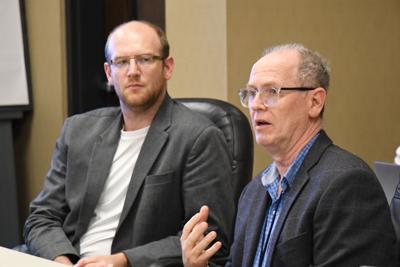SIOUX CENTER—The Sioux Center School District’s High Achievement Learner program is looking to enhance consistency among the school buildings, as the board of education learned at its meeting last Monday.
The program is led by Dale Landegent, who has been a part of the district’s programming for advanced learners for many years, starting with Clue. Titus Landegent, Dale’s son, joined the program as its second full-time employee this school year, having previously taught second-grade and kindergarten at Kinsey Elementary School.
HAL offers different methods of academic intervention for students in the top percentile at Kinsey, Sioux Center Intermediate School and Sioux Center Middle School.
According to Dale, data on all students’ math and reading proficiency are reviewed to determine if intervention is warranted.
As Titus explained, it takes more than a couple of good test scores to demonstrate that academic intervention is the best path forward for the student.
But when intervention is prudent, the task is to find what the best fit — or academic diet — is for the student, Dale said.
“Perhaps you think of a third-grader who reads at a seventh-grade level, and if we give them a third-grade diet, are you going to get a year’s growth? We’re about trying to alleviate that by trying to give them an age-appropriate diet with the rigor needed to see that kind of growing,” Dale said.
What form that intervention can take varies and is sorted into tiers.
The most radical is whole grade acceleration, where a student skips ahead a grade.
“About one or two a year take this option. It is a very radical step, and we use a tool called the Iowa Acceleration Scale, which is very well vetted and respected,” Dale said, adding that parents get the final say on skipping a grade.
It wasn’t until 2013 that the school board had adopted policy outlining this process.
Other times, a student will have subject acceleration, where a student advances ahead in one particular subject, such as in math or reading.
Most common is subject intervention, which replaces or enriches the general education curriculum they receive.
For example, when it comes to giving students higher level reading materials, Dale said deeper materials are sought, such as the works of Charles Dickens.
“Fifth-grade reading just did an abridged version of ‘Great Expectations,’ also reading from the original. Great characters, great stories,” Dale said.
A new addition this year has been the biliteracy program, which started at the kindergarten level and will add another grade level each year as the students move on. There are six kindergarten students in the program who were identified with the help of English Language teachers and classroom teachers.
“It’s students who have been identified that have some sort of notable aptitude to read, write, speak in both languages,” Titus said, adding that he’s fluent in Spanish. “It’s been a joy to get to read and write and speak with a group of six students from kindergarten.”
Titus said that this school year, he and Dale have looked into unifying HAL programming across the school district, as it was operating under different names in different buildings.
As part of this, a HAL handbook will be developed and ready for the school board to vote on by the fall of 2023.
“The goal is to align the goals and the focus of all HAL interventions for all stakeholders, really thinking through the whole list of who takes part in some way with this program,” Titus said, adding that it would solidify criteria for HAL identification and the intervention process.
The handbook would reflect district initiatives and principles as expressed in its belief statements. Titus has looked at examples from other school districts as well.
Doing this, Titus said, will “promote how program interventions are a rigorous, appropriate and necessary part of a gifted student’s learning experience.”
Expanding HAL programming to the high school level might be done in the future, along with additions such as after-school clubs, field trips and community partnerships.
